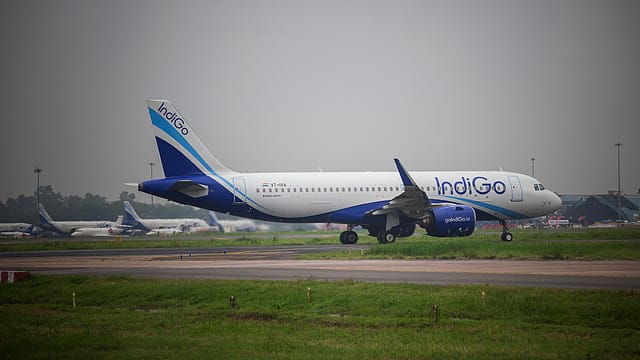IndiGo’s dirty linen out in the open
ADVERTISEMENT

Finally, the spat between Rakesh Gangwal and Rahul Bhatia, the co-founders of IndiGo, India’s biggest and most profitable airline, is out in the open. Gangwal, who owns approximately 37% stake in InterGlobe Aviation, the listed parent entity of IndiGo, shot off a letter to the Securities and Exchange Board of India (SEBI) on Tuesday in which he alleges violations of corporate governance norms by Bhatia and his affiliate entity IGE (InterGlobe Enterprises) Group.
While Bhatia owns an almost equal shareholding of approximately 38%, he has “unusual controlling rights over IndiGo”, as a result of a shareholders agreements between the two co-founders which is embedded in the articles of association of IndiGo.
In his 4-page letter, Gangwal, who is based in the U.S., provides a laundry list of corporate governance violations, beginning with IGE Group’s related party transitions with IndiGo. While IGE runs a host of other businesses spanning sectors such as hospitality, real estate, IT and BPM services, for Bhatia, the bulk of his personal wealth — pegged at $4.23 billion as per the Bloomberg Billionaires Index — comes from IndiGo.
“I hadn't contemplated that over the years, Mr. Bhatia would start building an ecosystem of other companies that would enter into dozens of related party transactions (RTPs) with IndiGo. We are not against RPTs as long as proper checks and balances exist and such RPTs are in the best interest of the Company,” wrote Gangwal in his letter.
January 2026
Netflix, which has been in India for a decade, has successfully struck a balance between high-class premium content and pricing that attracts a range of customers. Find out how the U.S. streaming giant evolved in India, plus an exclusive interview with CEO Ted Sarandos. Also read about the Best Investments for 2026, and how rising growth and easing inflation will come in handy for finance minister Nirmala Sitharaman as she prepares Budget 2026.
He went on to state that “Board decisions and resolutions on critical matters” were being implemented without “basic governance protocols and laws being followed.” He further stated that a key provision in the articles of association that the Chairman of the Board shall be appointed on the nomination of the IGE Group, “has the real potential to take away the independence of the Chairman.” At present, M. Damodaran, the former chairman of SEBI, is the chairman of InterGlobe Aviation.
“While we aren't questioning the independence of the current Chairman in his decision making, we are questioning the designation of such an individual as “independent”,” wrote Gangwal, who is seeking a change in the company’s articles of association by which Bhatia enjoys certain far-reaching privileges. They are: right to appoint 3 out of 6 directors of IndiGo; The Chairman of the Board shall be appointed on the nomination of the IGE Group; right to nominate and appoint the Managing Director; right to nominate and appoint the CEO; right to nominate and appoint the President, a voting arrangement that requires Gangwal to vote alongside the IGE Group on the
appointment of Directors.
According to Gangwal, “These rights remain embedded in the articles of association of IndiGo and will continue to remain so unless the articles are amended by a vote of shareholders holding more than 75% shares.” To this end, Gangwal was pressing for an Extraordinary General Meeting (EGM) of InterGlobe Aviation’s shareholders, which he claims was shot down by the airline’s board.
“In a split vote, the Board taking the decision to not allow an EGM upon being requisitioned by shareholders with approximately 37% of shareholding in the Company and also refusing to cooperate and provide the necessary information for the requisitionists to conduct the EGM themselves despite this right being available under law,” he wrote, stating that it was a direct violation of corporate governance.
Gangwal is of the opinion that such unusual rights for a minority shareholder like Bhatia “need a fresh look in light of the facts that IndiGo is now a critical national asset, serves almost 50% of the domestic air travelers.” The aviation industry in India, he added, “has regrettably experienced a checkered and difficult financial history and, especially, in the context that these unusual controlling rights seem to be the basis for the various violations of law and governance at IndiGo.” He makes a point that “The nation can ill afford IndiGo to ever falter.” His letter was even made public by InterGlobe Aviation to the Indian bourses.
